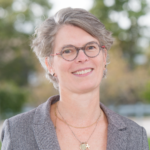Personnes invitées: Julia McNally; Tim Eckel; Moe Kabbara
lié à
Lectures
- 12:00 - 1:00 pm ET
The Electricity Equation: Solving for Abundance and Affordability
Résumé du webinaire
With the industries, homes, and vehicles of the future all requiring a highly electrified energy system, « demand forecasts are growing extraordinarily… [but] there’s not enough power to go around,” says Philippe Dunsky, Founder & President at Dunsky Energy + Climate Advisors, who moderated an expert panel on electricity abundance and affordability. While some claim this shift to an expanded electricity system will be universally beneficial, a strategic approach is needed to ensure Canadians can benefit, according to new analysis from the Transition Accelerator’s Electrifying Canada initiative.
This transition raises important questions: How can we maintain support for grid investments while keeping affordability a top priority? What are the challenges and opportunities in scaling electricity infrastructure?
Strategic planning is essential to make sure we’re building effectively to capture economies of scale, explains Moe Kabbara, Executive Vice President at the Transition Accelerator. « We’re not really going to stumble on [the future we want] by accident… this is not a fait accompli. We really need to make sure we’re building smart and effectively in terms of how we’re deploying technologies. »
At the same time, Canada’s electricity delivery system is aging, making now the critical moment for upgrades. « There will never be a cheaper time to build than now… If you can construct something, now is the time,” emphasizes Tim Eckel, former Vice-President of Energy Transition and Asset Management at SaskPower. However, it is not just about expansion—effective buildout also requires smarter infrastructure. « We can’t just jump into automation, because it’ll be chaos. You have to understand how the system works before you can start to automate it… and once you get the foundations in place, the other benefits will come, » added Eckel
But it’s not all scaling infrastructure: customers are the first to flag that affordability and abundance need to be at the centre of an expanded electricity system.
« If you want to get emissions down, you’ve got to fuel switch. What we’re finding when we talk to our customers, especially residential, is they may care deeply about climate change, but people don’t really get that it’s natural gas and fossil fuel combustion that’s causing it. So, speaking to them about emissions is really not resonating. We’re talking about how great electric technology is, and about its potential savings, » explained Julia McNally, Director, Climate Action at Toronto Hydro.
Presented with
Personnes invitées

Philippe Dunsky
Founder & President, Dunsky Energy + Climate Advisors
Personnes invitées

Julia McNally
Director, Climate Action, Toronto Hydro
Julia McNally is the Director of Climate Action at Toronto Hydro. In this role, Julia leads a team focused on helping Toronto Hydro’s customers to decarbonize.
Julia practiced administrative law for 14 years prior to joining the Ontario Power Authority (OPA) in January 2006, where she held the role of Director of Market Transformation. With the merger of the OPA and the IESO in 2015, Julia became the Director of Strategic Engagement & Innovation in Corporate Relations, and then led the Internal Audit division where she provided regular assessments of controls through assurance, as well as consulting services to management and the Board of Directors. Julia’s last role at the IESO was Director of Planning Projects & Sustainability, in this role Julia lead the IESO’s Pathways to Decarbonization, looking at how to make Ontario’s electricity grid zero emissions.
Currently, Julia is on the Board of Toronto District 2030, is the co-director of the Energy and Infrastructure LLM program, is on the Steering Committee of the Building Decarbonization Alliance and a volunteer Board member of the Toronto Windsurfing Club.
Mx. McNally has an MSc from the School of Oriental and African Studies, an LLB from The University of Toronto and an LLM from Cambridge University.

Tim Eckel
Energy Transition & Asset Management Consulting Engineer; former Senior Business Advisor and Vice-President of Energy Transition and Asset Management, SaskPower
Mr. Eckel is a consulting engineer focusing on the areas of utility energy transitions and asset management. He has spent more than 40 years in the electricity industry, most of which was with SaskPower, the provincial electric utility in Saskatchewan.
During his time at SaskPower he led the implementation of an asset management business model for the Generation, Transmission and Distribution divisions. He was also responsible for the Corporation’s sustainment and long-term planning, including the plans for net-zero, the generation supply plan and inter-regional transmission expansion. He led the Grid Modernization initiative which included the Advanced Meter Infrastructure, Advanced Distribution Management System and the Bulk Energy Storage programs.
He has been a member of several council/committees with a number of provincial, national and international organizations including Electricity Canada (EC), North American Reliability Corporation (NERC), the Centre of Excellence for Advanced Technological Innovation (CEATI) and the Saskatchewan Electric Reliability Authority (SERA) and was the Saskatchewan representative on the Canadian Electricity Advisory Council. He presently is a member of the Electrifying Canada Advisory Panel.
Tim holds a Bachelor of Science Degree in Electrical Engineering from the University of Saskatchewan, and a Master of Business Administration from the University of Regina. He is a professional engineer and member of the Association of Professional Engineers and Geoscientists of Saskatchewan. Tim also has the Institute of Corporate Directors Designation.
Mr. Eckel and his wife Bernie have two adult children and call Regina, SK home.

Moe Kabbara
PDG
Moe Kabbara est un expert chevronné des politiques énergétiques et industrielles, fort de près de 15 ans d’expérience à l’intersection de la technologie, des politiques publiques, des marchés et des chaînes d’approvisionnement. Son travail vise à générer des changements systémiques dans les secteurs de l’électricité, des combustibles, des bâtiments et de l’industrie.
À titre de PDG de l’Accélérateur de transition, Moe dirige des initiatives nationales et régionales qui soutiennent la transformation des systèmes énergétiques et industriels du Canada. Il supervise les travaux sur la planification du système électrique, la décarbonation des bâtiments, l’économie du futur, les combustibles à faible teneur en carbone, ainsi que la mise en œuvre régionale, en collaborant avec les différents secteurs afin d’harmoniser la planification, les investissements et l’exécution.
Avant de rejoindre l’Accélérateur de transition, Moe a été Consultant exécutif chez Dunsky Énergie + Climat, où il conseillait les gouvernements et les services publics sur l’élaboration de stratégies en matière d’énergie propre. Il a également occupé le poste d’agent principal de placements à Innovation, Sciences et Développement économique Canada, où il contribuait à l’attraction de placements dans les secteurs des batteries et de l’automobile dans le cadre de la stratégie industrielle émergente du pays. Plus tôt dans sa carrière, il a cofondé et dirigé une jeune entreprise spécialisée dans le stockage thermique de l’énergie, basée dans la région du Canada atlantique.
Moe est également l’un des artisans de plusieurs initiatives nationales, notamment Accélérer, Électrifier le Canada, et l’Alliance pour la décarbonation des bâtiments, des initiatives nationales visant à aligner les politiques, l’industrie et les infrastructures pour permettre la transformation économique et énergétique du pays.


